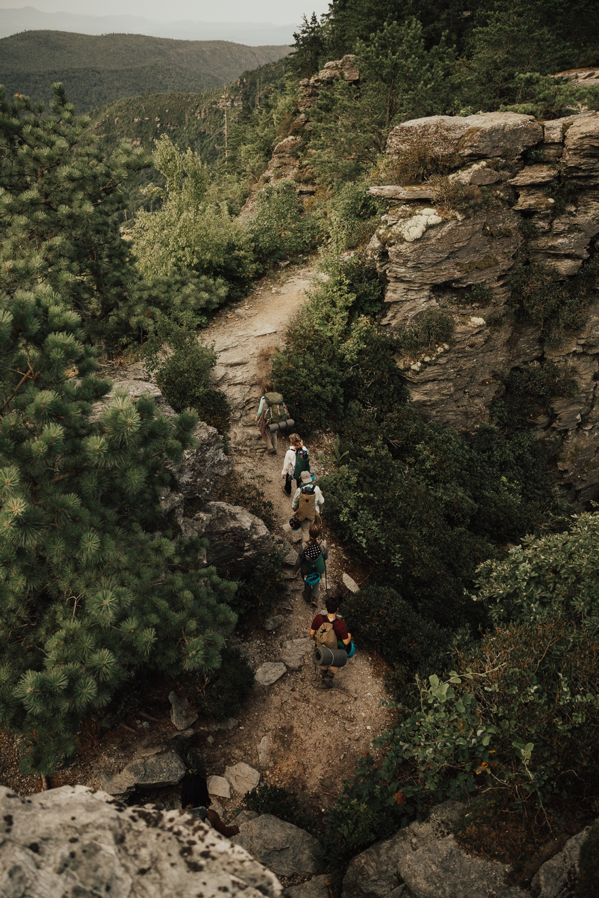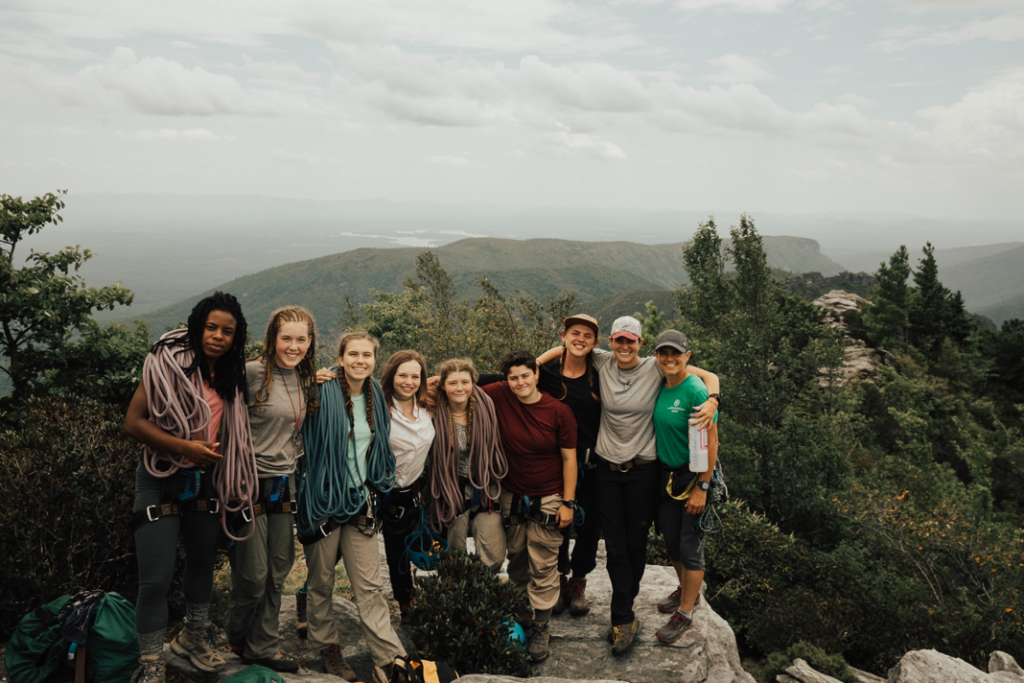
Kurt Hahn started Outward Bound in 1941 as a means of addressing the high casualty rate of young seamen in Great Britain whose ships were torpedoed in the North Atlantic.
Outward Bound’s history is rooted in finding solutions within catastrophe. Kurt Hahn started the program in 1941 as a means of addressing the high casualty rate of young seamen in Great Britain whose ships were torpedoed in the North Atlantic. Hahn recognized the young sailors’ lack of experiential awareness and the mass casualties that were occurring as a result. To combat this, he created a 21-day survival program designed to increase mental and physical aptitude and give its participants tools to be successful both on sea and in their lives. This was the first Outward Bound course, and it’s now a well-renowned experiential education program established in 35 countries all over the world.
Since the COVID-19 pandemic started, we’ve had several conversations with other Instructors within the Outward Bound community about how the crisis unfolding worldwide—and the ways in which we’re choosing to respond—is one type of challenge that we attempt to prepare our students for while on a course.
This got us thinking: how do Outward Bound courses prepare our students for real-life experiences? How does our role as Instructors and the philosophies that we take on—what we teach our students in the field—affect our own engagement with difficult experiences?
Through responses from multiple Instructors and student alumni from across the U.S., we identified themes on how Outward Bound courses transfer to real life. The following is what we found.
1. Outward Bound courses give you resilience to handle challenging times.
Challenging experiences can change your perception of your own capabilities. The self-knowledge that you can withstand hard times is power. One student alumna, Hannah, told us that pandemic life “felt odd, unknown, and scary. I realized that if I could learn to become comfortable in the Florida Everglades in two short weeks without basic amenities, I could definitely become comfortable in my own home during COVID-19.”
An Outward Bound course presents students and Instructors alike with immense challenge. Obviously this challenge looks and feels different for everyone, but completing a course gives you power. Alec, an Instructor, explained this well; “When I remember that feeling after getting off of a course, I am reminded that I CAN make it through this.” Kurt Hahn told us that after seeing ourselves overcome challenges “…for the rest of our lives we will be unwilling to settle for less.”
Another Instructor, Remi, displayed this spirit when she told us, “I know that I can survive difficult circumstances, and not merely survive, but even thrive during these times.” How’s that for not settling for less? An Outward Bound course requires that everyone involved dig deep and show grit. It’s this resilience that provides strength for the rest of your life, even when a pandemic comes along.

An Outward Bound course requires that everyone involved dig deep and show grit. It’s this resilience that provides strength for the rest of your life, even when a pandemic comes along.
2. Outward Bound courses give you tools for managing yourself.
The very first group of participants that Hahn worked with had a perceived lack of control over their experience. Like ships with no sails, they were allowing the rough waters of the sea to toss them in any direction. Though the waters they were sailing were rough and there was imminent danger present, they weren’t out of control of their situation, rather, they perceived they were. Many have felt this perceived lack of control during the pandemic.
On our courses, we teach our students that they aren’t subjects to their experience, rather, they’re active members of it. As student alumna Ellen shared, “When the news of COVID-19 hit, I remembered the strength I mustered on my Outward Bound course and how I couldn’t let my fears define my daily experiences.” On a course, we give students tangible tools that enable them to take ownership—tools like mindfulness practices built into evening meetings, duty delegation to give students active ways to support their crew and scheduled journal time to reflect on experiences.
Instructor Cliff explained, “We encourage students not to get lost in the challenge, in the difficulty of the moment but to practice thinking through it. What we’re really teaching students is to assess the situation and see what they can do to try and make their situation better.” The self-management tools we teach students changes one’s perspective of being a victim of experience, to owning your own experience. As Instructor Ryan summarized, this perspective shift allows us “to understand what we can control and where we want to focus our energies, and let the rest unfold.”

The self-management tools we teach changes your perspective of being a victim of experience in your life, to owning your own experience.
3. Outward Bound courses show you the importance of vulnerability and compassion.
It’s hard to be vulnerable. Though admitting our suffering can be challenging, expressions of vulnerability create space for compassion. Sam Harris, psychologist and author, explains that “loving kindness in the presence of suffering readily translates to compassion.” Courses provide opportunities for students to show their vulnerability and, in turn, compassion. Cecilia, a student alumna, shared her story of opening up to an Instructor regarding what was going on in her life, and “how good it felt to cry about it openly, and then how the rest of my crew, who were setting up tarps at the time, noticed I was crying and came to give me a group hug.” She goes on to explain that during the pandemic, “…while at home with my family, I’ve been sharing almost everything with them: my thoughts about school, college, the decisions I’m making right now… and it’s cut down on so much anxiety and stress and brought me so much closer to them.” It’s this vulnerability, the sharing of suffering, that inspires those around us to be compassionate towards us and towards others. We become resilient together.
One Instructor, Devin, shared his approach to suffering during this challenging time very eloquently; “I’ve exercised compassion for my partner as she struggles with unemployment; I’ve exercised compassion for healthcare workers and the grueling work ethic they’ve embraced; I’ve exercised compassion for myself as I grumble about wasted time or opportunities lost; and I’ve exercised compassion for those whose situation is not as comfortable as mine.” Connecting with this raw side of the human condition is something we often avoid. A course lets us practice, so that the next time we’re faced with obstacles, we’re ready to support and serve those around us.

The first Outward Bound course was designed to train sailors through the sea, not just for the sea, but for life.
The first Outward Bound course was designed to train sailors through the sea, not just for the sea, but for life. That philosophy is still alive today, especially in the age of the pandemic. Whether they trained through backpacking or boating, students and Instructors are adapting to a challenging new normal—a new way of life—just like they once did on an expedition.
There’ll never be an end to the challenges we face, but our awareness of the control we do have can help us face obstacles realistically and put our energy to its best use. Outward Bound courses teach resilience, self-management and the importance of compassion.
As we’ve read from Instructors and students alike, these values are absolutely relevant to navigating our lives, especially when a global pandemic is occurring.

Whether they trained through backpacking or boating, students and Instructors are adapting to a challenging new normal—a new way of life—just like they once did on an expedition.
About the Authors
Addie Hurwitz is a field Instructor for the North Carolina Outward Bound School, primarily out of Table Rock base camp. Addie has a degree in Recreation, Park, and Tourism Management from Penn State University. She loves working in experiential education, and takes similar joy from studying its academic side. When not on a course, Addie is likely skiing or traveling.
Rachel Veale is an Instructor for the North Carolina Outward Bound School. With a degree in Electronic Media and Communication from Texas Tech University, Rachel thrives at the intersection of content creation and outdoor spaces. Her go-to road trip snack is black coffee and donut holes. When she isn’t on course, you can find her running down a trail in western NC or chasing golden hour with a camera in hand.




